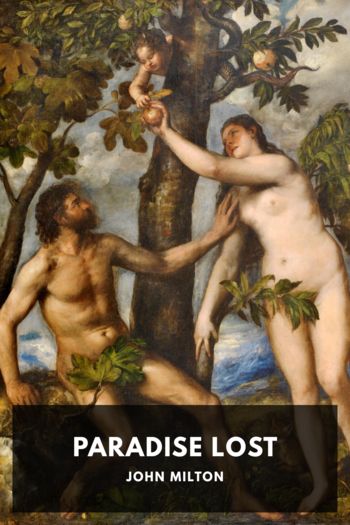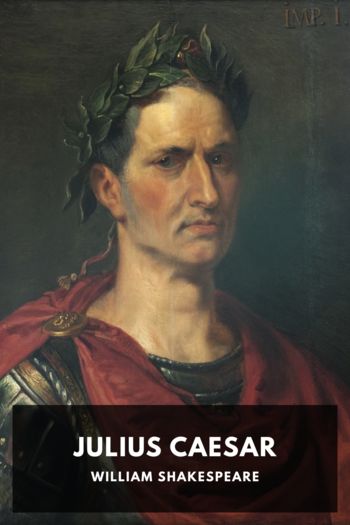The Wisdom of Father Brown by G. K. Chesterton (best english books to read .txt) 📕

- Author: G. K. Chesterton
Book online «The Wisdom of Father Brown by G. K. Chesterton (best english books to read .txt) 📕». Author G. K. Chesterton
“Then why did you send him out?” she cried, leaning forward with yet warmer curiosity. She had the proud, impetuous face that goes with reddish colouring, and a Roman nose, as it did in Marie Antoinette.
He looked at her steadily for the first time, and said: “Because I hoped you would speak to me.”
She looked back at him for some time with a heated face, in which there hung a red shadow of anger; then, despite her anxieties, humour broke out of her eyes and the corners of her mouth, and she answered almost grimly: “Well, if you’re so keen on my conversation, perhaps you’ll answer my question.” After a pause she added: “I had the honour to ask you why you thought the man’s nose was false.”
“The wax always spots like that just a little in this weather,” answered Father Brown with entire simplicity.
“But it’s such a crooked nose,” remonstrated the red-haired girl.
The priest smiled in his turn. “I don’t say it’s the sort of nose one would wear out of mere foppery,” he admitted. “This man, I think, wears it because his real nose is so much nicer.”
“But why?” she insisted.
“What is the nursery-rhyme?” observed Brown absentmindedly. “There was a crooked man and he went a crooked mile. … That man, I fancy, has gone a very crooked road—by following his nose.”
“Why, what’s he done?” she demanded, rather shakily.
“I don’t want to force your confidence by a hair,” said Father Brown, very quietly. “But I think you could tell me more about that than I can tell you.”
The girl sprang to her feet and stood quite quietly, but with clenched hands, like one about to stride away; then her hands loosened slowly, and she sat down again. “You are more of a mystery than all the others,” she said desperately, “but I feel there might be a heart in your mystery.”
“What we all dread most,” said the priest in a low voice, “is a maze with no centre. That is why atheism is only a nightmare.” “I will tell you everything,” said the red-haired girl doggedly, “except why I am telling you; and that I don’t know.”
She picked at the darned tablecloth and went on: “You look as if you knew what isn’t snobbery as well as what is; and when I say that ours is a good old family, you’ll understand it is a necessary part of the story; indeed, my chief danger is in my brother’s high-and-dry notions, noblesse oblige and all that. Well, my name is Christabel Carstairs; and my father was that Colonel Carstairs you’ve probably heard of, who made the famous Carstairs Collection of Roman coins. I could never describe my father to you; the nearest I can say is that he was very like a Roman coin himself. He was as handsome and as genuine and as valuable and as metallic and as out-of-date. He was prouder of his Collection than of his coat-of-arms—nobody could say more than that. His extraordinary character came out most in his will. He had two sons and one daughter. He quarrelled with one son, my brother Giles, and sent him to Australia on a small allowance. He then made a will leaving the Carstairs Collection, actually with a yet smaller allowance, to my brother Arthur. He meant it as a reward, as the highest honour he could offer, in acknowledgement of Arthur’s loyalty and rectitude and the distinctions he had already gained in mathematics and economics at Cambridge. He left me practically all his pretty large fortune; and I am sure he meant it in contempt.
“Arthur, you may say, might well complain of this; but Arthur is my father over again. Though he had some differences with my father in early youth, no sooner had he taken over the Collection than he became like a pagan priest dedicated to a temple. He mixed up these Roman halfpence with the honour of the Carstairs family in the same stiff, idolatrous way as his father before him. He acted as if Roman money must be guarded by all the Roman virtues. He took no pleasures; he spent nothing on himself; he lived for the Collection. Often he would not trouble to dress for his simple meals; but pattered about among the corded brown-paper parcels (which no one else was allowed to touch) in an old brown dressing-gown. With its rope and tassel and his pale, thin, refined face, it made him look like an old ascetic monk. Every now and then, though, he would appear dressed like a decidedly fashionable gentleman; but that was only when he went up to the London sales or shops to make an addition to the Carstairs Collection.
“Now, if you’ve known any young people, you won’t be shocked if I say that I got into rather a low frame of mind with all this; the frame of mind in which one begins to say that the Ancient Romans





Comments (0)